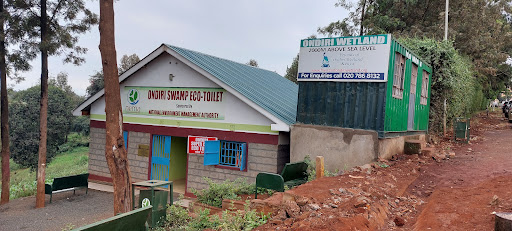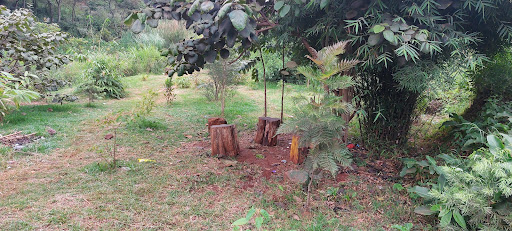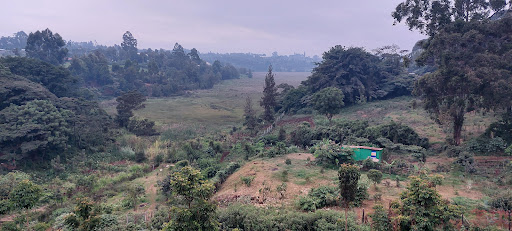In the early 20th century, when white settlers were venturing into Kenya, they came across a 'kahenia' (Kikuyu for shiny place) in Kiambu county that had an open lake.
Legend has it that during the construction of the Kenya-Uganda railway by the Imperial British East African Company, the workers used to source water from the lake for construction and used the water as a coolant for the steam-powered engines of the trains.
With time, increased human activity and natural occurrences turned this lake into a swamp: the Ondiri swamp.
Ondiri is a corruption of the English term 'old lake'.
Since 2016, Friends of Ondiri have made tremendous progress in restoring the lost glory of Ondiri.
“This place looked like a tragedy of the commons,” Samuel Njoroge, who heads the ecotourism department, said.
“People would dump waste right into the swamp. Sometimes we would camp at night, trying to identify these environmental polluters, but today it is no longer happening.”
The Ondiri wetland is a 40ha land close to Kikuyu town and along the southern Bypass.
It is about 12-15m (39-50ft) deep, but some areas around the wetland are deeper.
Ondiri is a unique wetland for it is the only one in Kenya exhibiting a highland quaking peat bog that is about 33.5ha and a forest cover that surrounds the region.
It is the second-largest and deepest in Africa after the one in Douala, Cameroon.
It changed from a lake to a swamp after it developed peat, a blanket-like structure formed by the accumulated deposit of decayed material that floats on top of a bog, which is the water beneath forming the wetland.
Locals believe that if someone drowns in the swamp, the body is recovered in Lake Naivasha seven days later.
Lack of rescue skills is said to have been the reason behind the myth.
Walking on top of the bog gives a tickling bouncy feeling, as if you are walking on the surface of a bouncing castle.
The wetland serves a community of more than 300,000 residents of Kikuyu.
Households and even industries in the area directly or indirectly consume water from Ondiri.
The swamp is also a source of water for the Nairobi river as it plays a part in the Athi Sabaki ecosystem.
Water flows from the swamp into the Nairobi river, down to the Athi river, to Tana River and then empties to the Indian Ocean via the Sabaki river, which is on the Malindi-Sabaki estuary.
Kikuyu Springs, a groundwater-protected zone in Magana Flowers, Kikuyu, recharges its water from Ondiri.
This place looked like a tragedy of the commons. People would dump waste right into the swamp. Sometimes we would camp at night, trying to identify these environmental polluters, but today it is no longer happening
CONSERVATION EFFORTS
For a while now, invasion by exotic tree species and environmental pollution, such as the disposal of sewer waste from households and industrial effluent by trucks, has posed a danger to the wetland.
This adversity led to the establishment of the Friends of Ondiri organisation in 2016.
Creation of awareness on biodiversity conservation and ecosystem restoration, lobbying and advocacy on policy matters are some of the main reasons behind the formation of the organisation.
The Ondiri swamp is now steadily picking as an ecotourism destination, enveloping activities that resonate around enhancing conservation.
Tourist activities include taking a walk around and on the peat bog, bird watching, team building, tree planting and taking a nature trail in the surrounding forest cover.
Samuel Njoroge, 40, a father of three and the founding director of Rhodes Holdings Limited, heads the ecotourism department in the organisation and also serves as a tour guide as well as a coordinator.
Samuel formed his company in 2015 together with his wife, Rhoda Nyambura, and established three different subsidiaries.
Rhodes tours and travel was founded the same year, Rhodes daycare in 2017 as a way of giving back to the community and Mizpa guesthouse in 2021, which serves as an Airbnb to tourists who visit the area.
Upon the formation of the organisation, Samuel joined the team due to his personal interest in conservation and also volunteered his time to educate people about Ondiri.
Members of Friends of Ondiri felt the need to commune as volunteers to conserve the water in the wetland, try to restore the indigenous forest that existed and create community awareness on the beauty of Ondiri.
People from abroad who understand what we have here in Kikuyu would come all the way to bird watch, for example
WHY IT'S IMPORTANT
The wetland serves as a habitat for different species of birds, a good research place for individuals and institutions, and the swamp serves as a carbon store, sucking the already existing element in the air and storing it.
This purifies the water, making it a lot cleaner for consumption.
Samuel said it is unfortunate that the people of Kiambu fail to recognise Ondiri as a tourist destination.
“When I ask you where you would want to go for a trip, you would probably tell me the Nairobi National Park, Maasai Mara, Amboseli or even Samburu. People from abroad who understand what we have here in Kikuyu would come all the way to bird watch, for example,” he said.
The peatland area in Europe is more than 1 million sq km, almost 10 per cent of the total surface area.
Samuel said peatlands are a rare occurrence in Africa, specifically in Kenya.
In a bid to restore the face of Ondiri, Friends of Ondiri established a Wetland Information Centre as a repository of information about the surrounding environment, water and other natural resources.
It also serves as a contact centre manned by the group’s members, who are solely volunteers and a community meeting point.
Samuel said that through the group’s lobby activities, they brought on board government agencies, such as Nema, Water Resource Authority, Kenya Forest Service, Kenya Forest Research Institute, the Kiambu county government and the Environment ministry.
“We have worked closely with Nema since 2021 and, therefore, we requested support in putting up an eco-toilet and some small shops to generate income. The money generated is regenerated back to aid in the operations of the organisation,” Samuel said.
The eco-toilet cost about Sh2.5 million to construct and was launched on February 2, 2022, in celebration of World Wetlands Day by Environment CAS Mohammed Elmi on behalf of CS Keriako Tobiko.
It runs fully on green energy and is intended to recycle water used in the near future to serve as a role model to the community on waste management.
The land on which the toilet stands was donated by a veteran who is also a riparian land owner of more than 50 years around Ondiri.
The Water Resource Authority has done a 3.7km fencing at a cost of Sh4 million. This has mitigated encroachment into the wetland.
Riparian land owners around the wetland are encouraged to practise organic farming as the use of pesticides and chemical fertilisers, especially in greenhouses, can introduce toxins into the water.
"There is a thin line between agricultural activities occurring and ongoing forest conservation. Those who had already farmed near the wetland were told not to extend because for arrowroot farmers, for example, the crop does well near water sources," Samuel said.
"They were told they do not need a warning to vacate. In a few years to come and when the trees have grown and they form a canopy, this will adversely chase them away as nothing will be able to grow beneath and the forest will have been restored."
Today, the wetland still awaits gazettement, which would ensure it is protected and considered an area of importance. It also means that they can adequately enforce their management plan, once launched, and they can take action towards the cause of Ondiri.
“As of now, we lack the capacity to exercise some level of power and take legal action. We depend and work closely with different environment offices to fight against illegal activities that occur around the area. We ask the government to hasten this process,” Samuel said.




ECOTOURISM THRILL
For adventure lovers, the Ondiri wetland is home to 76 different bird species.
The Nature Kenya list of 2019 reported that some of the birds identified in the area include the Golden-Crested Crane, also referred to as “muhau” in the Kikuyu language, which signifies that the place has clean water.
Others include the Montane nightjar that makes sweet sounds at night, Augur buzzard, Weaver bird, Speckled mousebird, Firefinch, Sparrows and Grey heron.
Ondiri used to be home to the Sitatunga Antelope but they became extinct in the area. However, they can be found in Saiwa Swamp Park in Kitale, Trans Nzoia county.
Ondiri swamp is also home to different kinds of aquatic life, that is, cold-blooded vertebrae.
“We have identified fish such as the crayfish. We have also involved researchers and we were told that we can expect to see some reptiles like snakes and amphibians like toads and frogs,” Samuel said.
Friends of Ondiri, in collaboration with KFS and Kefri, have established a programme that involves replacing exotic trees with indigenous ones.
“So far, we have grown about 11,000 trees and educated the community, specifically land owners around Ondiri, on the dangers posed by exotic trees like the Eucalyptus. We have cut down about 300 of those trees and planted the native ones,” Samuel said.
In case you are looking to visit the area or conduct activities such as a group picnic or team building, be sure to visit the Ondiri Wetland Information Centre to seek guidance on a fruitful eco-tour.
This will include a three- to four-hour trip around and on top of the quacking peat bog, bird watching and a nature trail in the surrounding forest, accompanied by after-tour activities organised as per your request.
A fee of Sh200 is charged per person when a tour guide is requested, and it will cost a little bit more in case you need food to be organised for your tour.
These organised tours are coordinated by the organisation through its concerted efforts to educate the community and tourists at large on the beauty and benefits of the Ondiri wetland.
One can also stay at the Mizpa guesthouse, which is located within close proximity of the wetland, and enjoy a beautiful evening around a bonfire with family or friends.

